|
|
|
Sort Order |
|
|
|
Items / Page
|
|
|
|
|
|
|
| Srl | Item |
| 1 |
ID:
164743
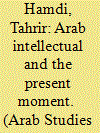

|
|
|
|
|
| Summary/Abstract |
The Iraqi poet Saadi Youssef urgently asks, “Why are the poets silent?/Where have they gone?” These questions underscore the compelling need for the guiding voices of Arab intellectuals at this deeply divided present moment in the Arab world that has effectively seen the destruction of seemingly stable nations and identities. It is important to understand why and how easily “things fell apart” for Arab nations and peoples under the destructive influence and direct intervention of imperialist and Zionist agendas and forces. What does it mean to speak truth to power in the current Arab and global context where the destruction of Arab nations, such as Iraq, Syria, Libya, and Yemen has become the all too familiar, convenient, and accepted status quo, which is marked by destructive and exclusionary discourses? It has become incumbent upon the Arab intellectual/writer/poet to lead the self-examination process in order to provide an understanding of the current Arab situation within its greater global context and construct a revolutionary and insurrectionary oppositional discourse that would expose and dismantle the current defeatist and divisionary discourses. Antonio Gramsci's concepts of hegemony and consent, Louis Althusser's ideological state apparatuses, and Edward Said's important ideas on the intellectual's critical consciousness, secular criticism, and beginnings are the theoretical lenses used to help decipher the catastrophic happenings in the Arab world. This study also examines excerpts of literary works by important Arab poets/intellectuals, such as Mahmoud Darwish, Mourid Barghouti, Bader Shaker Al-Sayyab, Saadi Youssef, and Yusuf Al-Ani.
|
|
|
|
|
|
|
|
|
|
|
|
|
|
|
|
| 2 |
ID:
101841


|
|
|
|
|
| Publication |
2011.
|
| Summary/Abstract |
This essay argues that many modern discussions of Locke's political theory are unconsciously shaped by an imaginative picture of the world inherited from the past, on which authority and freedom are fundamentally antipathetic. The consequences of this picture may be seen in the distinction made customarily in Locke studies between the 'authoritarian' Locke of Two Tracts on Government, for whom authority descends from God, and the later, 'liberal,' Locke, for whom authority arises from the will and agreement of individuals, and felt in the emphases placed on consent and resistance in most interpretations of Lockean political thought. The essay examines the composition and contours of this picture and, by holding up a mirror to contemporary Locke scholarship, draws attention to some of the ways in which it unwittingly distorts Locke's thinking.
|
|
|
|
|
|
|
|
|
|
|
|
|
|
|
|
| 3 |
ID:
183956
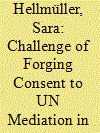

|
|
|
|
|
| Summary/Abstract |
This article analyzes how the internationalization of civil wars influences conflict parties’ consent to UN mediation processes. Illustrated by the UN mediation in Syria, I argue that internationalization influences consent directly by obstructing the advent of a costly stalemate and the parties’ perception of mediation as a ‘way out,’ and indirectly by reducing mediators’ leverage and perceived impartiality thereby limiting their tools to foster consent. The article makes three contributions. First, it presents a novel conceptual framework to understand the impact of internationalization on conflict parties’ consent. Second, it provides a long-term analysis of UN mediation in Syria from 2012–2020. Third, it contributes to a broader discussion about how civil wars end. This is of particular relevance as the prioritization of a political over a military end to civil wars, which was dominant in the early post-Cold War period, is no longer unquestioned.
|
|
|
|
|
|
|
|
|
|
|
|
|
|
|
|
| 4 |
ID:
152362


|
|
|
|
|
| Summary/Abstract |
In our imperfect world, rape happens frequently but nearly no one publicly defends the legitimacy of forcible or nonconsensual sex. So pervasive is deference to some notion of consent that even Daʿish supporters who uphold the permissibility of enslaving women captured in war can insist that their refusal or resistance makes sex unlawful. Apparently, one can simultaneously laud slave concubinage and anathematize rape. A surprising assertion about consent also appears in a recent monograph by a scholar of Islamic legal history who declares in passing that the Qurʾan forbids nonconsensual relationships between owners and their female slaves, claiming that “the master–slave relationship creates a status through which sexual relations may become licit, provided both parties consent.” She contends that “the sources” treat a master's nonconsensual sex with his female slave as “tantamount to the crime of zinā [illicit sex] and/or rape.” Though I believe in the strongest possible terms that meaningful consent is a prerequisite for ethical sexual relationships, I am at a loss to find this stance mirrored in the premodern Muslim legal tradition, which accepted and regulated slavery, including sex between male masters and their female slaves.
|
|
|
|
|
|
|
|
|
|
|
|
|
|
|
|
| 5 |
ID:
152125


|
|
|
|
|
| Summary/Abstract |
The argument of the moral economy of mines claims to illuminate the consent and associational power of mineworkers, and thereby the real foundation of social exchanges between management and black mineworkers. Our collection of life histories shows how the moral economy was fragile and its codes not widely accepted. As a tool of analysis it does not include certain facets of the workers’ experience, feeling and human essence. The moral–economic relationship was conducive to surplus extraction by eliminating the non-conformist but industrious or sick workers in the labour system. It contributed to morbid sexual and emotional ways of life. The life histories further reveal how the rank-and-file generally endorsed and participated in what Moodie depicts as a positive class compromise struck between management and the workers’ union from the 1980s to the 1990s. It brought to them conditions for a regular family life and ‘advancing humanity’. This notwithstanding, our narrators found that the norm of apartheid gave way to that of discrimination and differentiation between black workers. Management replaced white ‘boss-ism’ by economism and a corporatist model of labour–management relationship. It engendered the spirit of new ways to secure opportunity.
|
|
|
|
|
|
|
|
|
|
|
|
|
|
|
|
| 6 |
ID:
192185
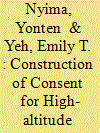

|
|
|
|
|
| Summary/Abstract |
In 2018, the Tibet Autonomous Region began resettling pastoralists from high-altitude areas to newly built settlements in distant, lower-altitude farming locations under the “extremely high-altitude ecological resettlement” programme, with a stated dual purpose of environmental protection and improving pastoralist well-being. The programme is said to be based on a principle of “government guidance and voluntary participation.” However, despite its stated “voluntary” nature, the government reports a 100 per cent rate of agreement to participate. After examining the ecological rationales for resettlement and pastoralists’ reluctance to move owing to livelihood concerns and attachment to homeland, the article examines how consent is achieved. Based on official documents and reports as well as semi-structured interviews with officials and pastoralists in Nagchu Municipality, the core target area for the programme, the article identifies a three-step “thought-work” oriented process – beginning with an initial survey, followed by group incentives and warnings and then individual incentives and warnings – which is deployed until pastoralists sign a resettlement agreement. The process illustrates the dialectical relationship between coercion and consent.
|
|
|
|
|
|
|
|
|
|
|
|
|
|
|
|
| 7 |
ID:
093695
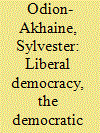

|
|
|
|
|
| Publication |
2009.
|
| Summary/Abstract |
This article examines the essential elements of liberalism and identifies its linkage with liberal democracy against the backdrop of the recent Nigerian general elections. It further foregrounds the democratic method as a core value of liberal democracy. The Nigerian 2007 elections are assessed in order to reveal the extent of its departure from the democratic method. The failure of the democratic method, the article argues has consequences for democracy in Nigeria, especially the place of consent and legitimacy in the governance continuum. It concludes by proffering ways to strengthen the democratic method so that votes can count and be meaningful.
|
|
|
|
|
|
|
|
|
|
|
|
|
|
|
|
| 8 |
ID:
112368
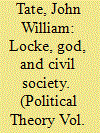

|
|
|
|
|
| Publication |
2012.
|
| Summary/Abstract |
Timothy Stanton is the latest in a line of Locke scholars who, in focusing on Locke's theological commitments, have sought to place these at the center of his political philosophy. Stanton insists that those who interpret Locke's political philosophy in more material terms, centered on individual liberty, government authority, and the need to reconcile both via consent, apply to it a misleading "picture" and fail to perceive its essentials. By showing that this is precisely how Locke himself intended his political philosophy to be understood, with the theology substantially removed, this article shows how Stanton is profoundly mistaken in his interpretation of Locke.
|
|
|
|
|
|
|
|
|
|
|
|
|
|
|
|
| 9 |
ID:
173889
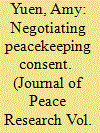

|
|
|
|
|
| Summary/Abstract |
The mixed record on civil war termination shows that it is a difficult task, one fraught with uncertainty and risk. Gaining consent for peacekeeping is one strategy policymakers and scholars forward to reduce these concerns. Formal and informal work argues that allowing peacekeeping serves as a costly signal of peaceful intentions; however, these models treat peacekeeping costs as exogenous. I argue that peacekeeping costs have an endogenous element and use consent for peacekeeping missions as a proxy measure. Three conclusions are evident. It is difficult to determine whether belligerents are insincere actors in a peace process or merely distrustful, but consent can tell us whether a ceasefire is precarious and therefore more likely to fail; peacekeeping is difficult but meaningful under some conditions, and reliable information can be taken from negotiating, not just war-fighting. These results qualify the extent to which peacekeeping, with its changing emphasis on consent, can improve its outcomes.
|
|
|
|
|
|
|
|
|
|
|
|
|
|
|
|
| 10 |
ID:
153728
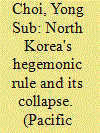

|
|
|
|
|
| Summary/Abstract |
Ideological leadership through the Party was at the core of the North Korean leaders’ hegemonic rule over the people, which resulted in the great popularity of Kim Il-sung. Marketisation in the wake of the economic crisis, however, significantly impaired the mechanism for rule by consent, especially by triggering the influx of outside information and undermining the Party's ideological education activities. The economic crisis led the state to adjust the mechanism of consent and coercion in such a way that the state's control over society could be restored by relying more on rule by force, which was demonstrated by the much stricter penal system, bloody purges and, most of all, military-first politics. This, nonetheless, was a temporary measure because, in Guha's terms, ‘dominance without hegemony’ would not be durable in the long term. The regime can sustain itself in the long-term only through the reinstatement of the consent mechanism, which disintegrated owing to the marketisation. However, as the marketisation, being beneficial to those who have power as well as ordinary people, is irreversible in North Korea today, the reestablishment of hegemonic rule would not be attainable.
|
|
|
|
|
|
|
|
|
|
|
|
|
|
|
|
| 11 |
ID:
113309


|
|
|
|
|
| Publication |
2012.
|
| Summary/Abstract |
A previous article in this journal presented a conceptualisation of the political legitimacy of the state and its operationalisation for 72 countries c. 2000. This article provides an updated dataset of state legitimacy for 52 countries c. 2008 using the same conceptualisation. It presents a brief discussion of the comparative results of the two datasets.
|
|
|
|
|
|
|
|
|
|
|
|
|
|
|
|
|
|
|
|
|